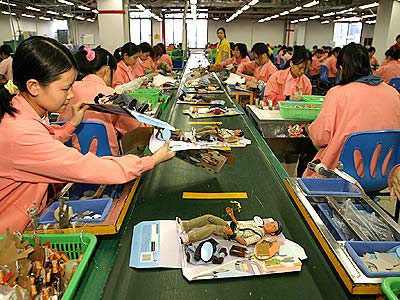
Higher prices for GI Joe? Source: www.pubtheo.com
Very nice, short piece today from CSFB (below) on what China is doing to correct the global imbalances (i.e., to reduce its trade surpluses, which mirror US and other countries’ trade deficits) and to shift its economy to a healthier foundation based on domestic demand. While President Obama gets pre-election press pressuring China’s prime minister to let his currency appreciate, and while Dems in Congress led by Chuck Schumer grandstand, threatening to raise tariffs on China before the election, the Chinese authorities have instituted large wage increases across the board. As a result, the real value of the Chinese currency could appreciate sharply, even if the nominal value (the focus of American politicians) appreciates in baby steps. Hopefully, Schumer, Obama and Co., and above all the angry voters they are courting, understand the economics: that wage inflation undermines the competitiveness of a country’s goods as much as does currency appreciation.
In spite of President Obama’s tough talk (or because of it?), he appears to have received a boost from China’s prime minister, who lauded his administration’s economic policies, much-maligned these days by the Republicans (who have few ideas of their own). But, what China bashers don’t realize, and CSFB points out, is that low inflation in the US (i.e. the affordability of America’s consumption binge) has been underpinned over the last 10-15 years by China’s low wages cum undervalued exchange rate, Sir Alan Greenspan’s claims to perfection notwithstanding. From computers to home improvement, Chinese goods have been cheap. We won’t be able to count on this any more. With America still in a near-recessionary funk, we’re not worried about inflation, but that could change. Enormous government budget deficits have been accommodated by a massive monetary stimulus. Hence, inflation, and all the economic distortions implied, may be one of a slew of economic problems facing the world’s leading (though declining) power in the years to come.
From CSFB today:
In contrast to the exchange rate, wage rates among migrant workers have risen much more aggressively, and we believe that this marks the beginning of the end of China’s export empire. Among 31 provinces, 27 have raised the minimal salary by an average of 22% this year and the remaining four will introducing legislation for salary hikes later this year. We think the move has been pushed by Beijing as part of an effort to shift the economy from export-driven to domestic-consumption-driven. In a survey Credit Suisse conducted, 39% of CEOs from multinational corporations placed a wage increase as something about which they were “very worried” or “extremely worried,” versus 18% for exchange rate appreciation.
The key question to be answered is whether foreign direct investments will leave China or move to the inland provinces. We believe most will move inland rather than leave China. China’s domestic demand is a major attraction for FDI. Besides, China’s infrastructure and administrative efficiency probably will keep FDI coming, for now. However, we project 20%-30% salary increases at the migrant workers’ market every year over the next four years (at least). This would eventually erode China’s competitiveness and push up its export prices. Perhaps we have seen the best time for China as the anchor of global disinflation, though it may take more than a decade for China’s export machine to fall.
Dong Tao +852 2101 7469 [email protected]
Christiaan Tuntono +852 2101 7409 [email protected]
05 October 2010
The RMB exchange rate saw a surge in appreciation in recent days, but we doubt the trend will last long. The Chinese currency saw nine consecutive days of appreciation against the USD, amidst USD weakness and heightened pressure from the White House and the Capitol Hill. But to us, Beijing has, in fact, been pushing for real exchange rate appreciation through salary increases, much more aggressively than with the nominal exchange rate. With export orders softening and domestic salary surging, we project only marginal nominal appreciation, which is politically motivated. We look for USDRMB at 6.67 by end of 2010 and 6.35 by 2011.
(Image above: Higher prices for GI Joe? Source: Google Images)